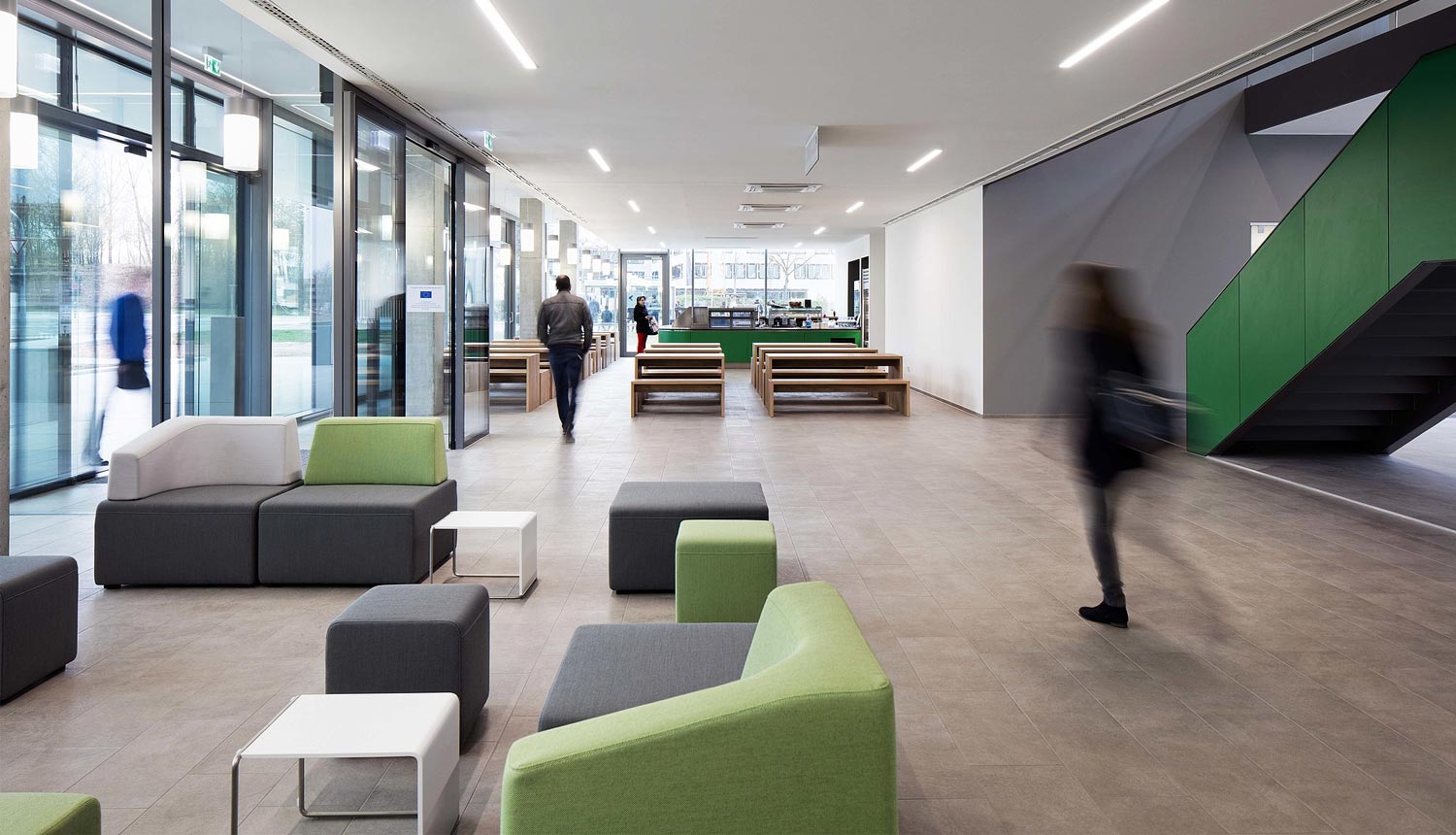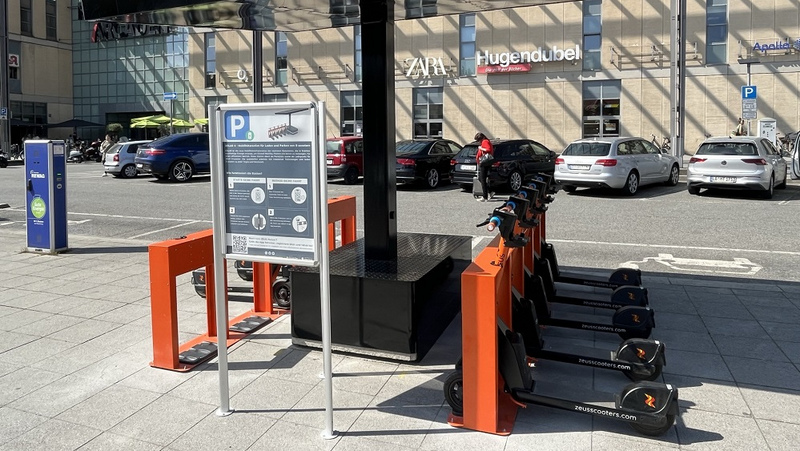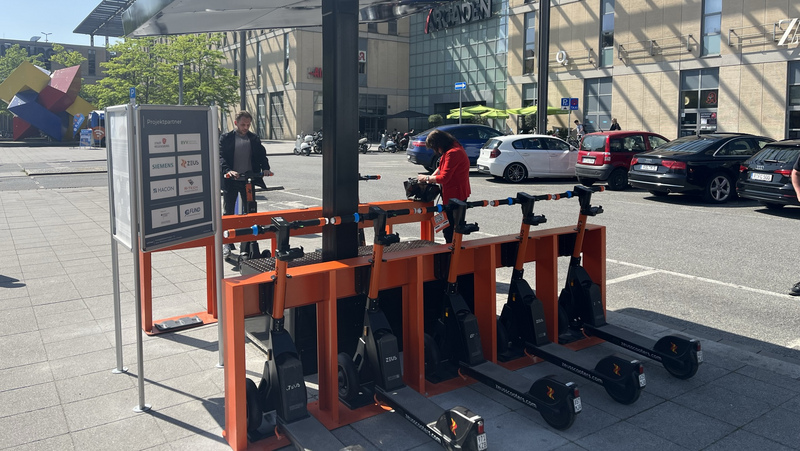The aim of the overall project "Targeted integration, control and management of micromobility services" (ZIStEM) was to investigate whether micromobility services and their combination with other modes of transport can contribute to making urban transport more sustainable, efficient and attractive. Micromobility includes electrically powered micro-vehicles that are used as an alternative to conventional means of transportation, such as e-scooters, e-bikes and e-cargo bikes.
As part of the project, specific measures were developed, tested for feasibility and implemented on a pilot basis. These measures included
- Further development of the Zeus e-scooters with improved product features in terms of safety and comfort,
- Infrastructural measures, such as the planning of over 30 parking spaces for the sharing e-scooters and
- the development and installation of three ZOLAR stations.
The innovative ZOLAR stations were set up for the first time as part of the project at the three locations Arcaden, TechBase and Burgweinting station. These are self-sufficient charging stations that are powered by solar energy. Up to 10 scooters or, depending on the rack, e-bikes can be docked at each station.
In addition, an app for intermodal routing was developed as a test, which was to be evaluated by a selected group of test users. The aim here was to use an interactive mode to survey usage habits, such as frequency and, if necessary, the combination with other modes of transport - such as local public transport.
The success of new mobility services depends to a large extent on public acceptance. The focus of the citizen survey from the end of July to mid-August 2023 was therefore to filter out whether micromobility services are beneficial in terms of transport from the citizens' point of view or are viewed rather critically.
A total of around 1,400 people from Regensburg and the surrounding area took part in the survey. The main results were:
- Almost two thirds of those surveyed used their bicycle at least 4 times a week.
- By contrast, only 24% used their car to the same extent.
- The most decisive criteria for the choice of means of transport are the time factor, the issue of sustainability/environmental protection and availability.
- Around two thirds of respondents also have a negative or at least somewhat negative attitude towards e-scooter sharing.
- E-scooters replace 15% of car journeys.
- The establishment of mandatory parking spaces for e-scooter sharing is supported by a large majority.
Findings:
The high shift potential from MIT (motorized private transport, e.g. cars) to micromobility services identified in a previous study could not be confirmed for e-scooters as a means of transport. According to the survey, one in seven e-scooter journeys replaces a car journey, but at the same time they also compensate for 80% of journeys that would otherwise be made on foot, by bike or by bus and train.
Even five years after the introduction of the Ordinance on Small Electric Vehicles, the public's attitude towards e-scooters in sharing is still largely negative. The majority are in favor of mandatory parking spaces for these services, which is now being implemented in Regensburg's old town area.
To a certain extent, intermodal trip chains can replace trips by private motorized transport if the use of sharing vehicles can be planned. This plannability is directly dependent on the availability of e-scooters at the transfer point or starting point of the journey. The attractiveness of this alternative to MIT is also linked to the costs.
The survey also showed that attitudes towards rental bikes and, to an even greater extent, rental cargo bikes are positive. In general, bicycles are one of the preferred means of transportation in Regensburg. The results on the "Targeted integration, control and management of micromobility services" could be supplemented by further research, e.g. with a focus on rental bikes and rental cargo bikes.
Background:
In addition to the provider Zeus, the Regensburg city administration, Siemens, RVV, HACON Ingenieurgesellschaft mbH and R-Tech GmbH with the Mobility & Logistics cluster were involved in the "ZISteM" project.
The "ZISteM" project was funded by the Federal Ministry of Digital and Transport. As part of the mFUND innovation initiative, the BMDV has been funding data-based research and development projects for the digital and connected mobility of the future since 2016. The project funding is supplemented by active professional networking between stakeholders from politics, business, administration and research and by the provision of open data in the Mobilithek. Further information can be found at www.mfund.de.
Press contact:
R-Tech GmbH
Tanja Braun
Head of Corporate Communications
Tel.: 0941/604 889-13
E-Mail: tanja.braun@techbase.de
www.techbase.de

![[Translate to Englisch:] Innovationszentrum TechBase](/fileadmin/user_upload/Logos/logo_techbase.png)

